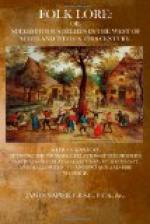Upon the first sight of the new moon stand still and take a small portion of earth from under the right foot, make it into a paste, put it on the wart and wrap it round with a cloth, and thus let it remain till that moon is out. The moon’s influence and the fasting spittle are very old superstitions.
The moon or Ashtoreth, the consort of Baal, was the great female deity of the ancients, and so an appeal to the moon for the purpose of removing interferences with beauty, such as skin excrescences, was quite appropriate. Moon worship was practised in this country in prehistoric times. Bailey, in his Etymological Dictionary, under article “Moon,” says, “The moon was an ancient idol of England, and worshipped by the Britons in the form of a beautiful maid, having her head covered, with two ears standing out. The common people in some counties of England are accustomed at the prime of the moon to say ’It is a fine moon. God bless her.’”
From a custom in Scotland (particularly in the Highlands) where the young women make courtesy to the new moon by getting upon a gate or style and sitting astride, they say—
“All hail to the moon, all
hail to thee,
I prithee good moon declare
to me
This very night who my husband
shall be.”
Every one knows the popular adage about having money in the pocket when the new moon is first seen, and that if the coins be turned over at the time, money will not fail you during that moon. To see the new moon through glass, however, breaks the charm. It was a prevalent belief that if a person on catching the first glimpse of new moon, were to instantly stand still, kiss their hand three times to the moon, and bow to it, that they would find something of value before that moon was out. Such practices are evidently survivals of moon worship. How closely does this last practice agree with what Job says (chap. xxxi, 26),—“If I beheld the sun when it shined, or the moon walking in brightness, and my heart hath been secretly enticed, or my mouth hath kissed my hand: this also were an iniquity to be punished by the Judge: for I should have denied the God that is above.”
The good influence of the fasting spittle in destroying the influence of an evil eye has been already referred to in the previous pages, but it was also esteemed a potent remedy in curing certain diseases. To moisten a wart for several days in succession with the fasting spittle removes it. I have often seen a nurse bathe the eyes of a baby in the morning with her fasting spittle, to cure or prevent sore eyes. I have heard the same cure recommended for roughness of the skin and other skin diseases. Maimonides states that the Jews were expressly forbidden by their traditions to put fasting-spittle upon the eyes on the Sabbath day, because to do so was to perform work, the great Sabbath crime in the eyes of the Pharisees which Christ committed when he moistened the clay




